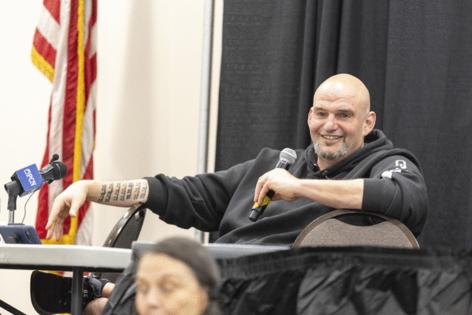Senators: Deep cuts in coal mine safety protections threaten miners
Published in News & Features
A group of prominent U.S. senators is demanding answers about the Trump administration's sweeping cuts to a mine health and safety agency whose largest office is just outside Pittsburgh.
The Democratic senators — including John Fetterman of Pennsylvania and Mark Warner of Virginia — warned in a letter to Health and Human Services Secretary Robert F. Kennedy Jr. that the layoffs of hundreds of federal researchers and investigators could endanger the lives of coal miners throughout Appalachia.
Nearly 300 workers at the Pittsburgh Mining Research Division — nearly the entire office — are set to lose their jobs, the senators wrote, citing a Post-Gazette story about the firings. Hundreds more mine safety workers are being let go from offices in Morgantown, W.Va. and Spokane, Wash.
Taken together, those cuts would severely impact the main offices of the federal government's Mining Research Program, a division of the National Institute for Occupational Safety and Health, according to the letter.
The lawmakers want Kennedy to provide a detailed accounting of which jobs will be slashed, how many more mine safety positions the administration plans to cut and how many federal workers are left to oversee critical protections in the country's mines.
The lawmakers also warned that the firings are coming at a particularly dangerous time in the coal industry, as a more virulent form of black lung disease is sweeping through the region's mines.
"We urge you to reverse these cuts before it's too late," the senators wrote.
The job losses are part of broader cuts that threaten to gut NIOSH, an agency Congress created to conduct vital research into threats to worker safety throughout the country.
In all, the agency could lose 873 employees in the coming weeks — two-thirds of its entire workforce, according to the letter from Virginia Senators Tim Kaine and Warner, Sen. Bernie Sanders of Vermont, and Fetterman.
The cuts to the Pittsburgh office hit two key divisions: one focused on preventing injuries and deaths inside mines, and another that certifies a broad range of respirators used by everyone from health care workers to firefighters.
The across-the-board firings are also "decimating" the Enhanced Coal Workers' Health Surveillance Program, which uses a mobile medical unit to screen miners for signs of black lung disease, the senators wrote.
"Never has there been a more critical time to do this work," according to the letter.
In recent years, as the remaining coal seams have grown thinner and miners have been forced to cut through more granite, the air underground has been permeated with silica crystals, a dangerous dust that has caused black lung to harm the workers at much younger ages than it has in the past.
Safety advocates worked for decades to win the approval of a new regulation that dramatically reduces the amount of silica that miners can breathe. The Trump administration announced on Tuesday that it would pause enforcement of the rule until August 18, four months after it was set to take effect.
The agency responsible for inspecting coal mines and enforcing crucial safety rules like the silica dust limit — the Mine Safety and Health Administration — faces its own uncertain future.
An investigation by the Post-Gazette found that the Department of Government Efficiency, the Elon Musk-led effort to slash federal spending, canceled leases for 34 MSHA safety offices across the country — including the nation's most active in Mount Pleasant, Westmoreland County.
The investigation also found that the closings were taking place as injuries in some of the country's most active mines had increased over the past decade.
Advocates warned that the cuts threaten the government's ability to force mine owners to follow safety rules that were created after decades of deadly accidents deep underground.
Even as the federal government targets mine safety agencies for cutbacks, the White House is pushing to increase coal production across the country.
A series of executive orders signed by Trump on Tuesday pushed regulators to loosen rules on coal operators, open more federal lands to mining and promote coal-fired electricity generation to grow demand for a fuel that once dominated the U.S. power grid but whose use has dropped significantly in recent years.
_____
© 2025 the Pittsburgh Post-Gazette. Visit www.post-gazette.com. Distributed by Tribune Content Agency, LLC.







Comments